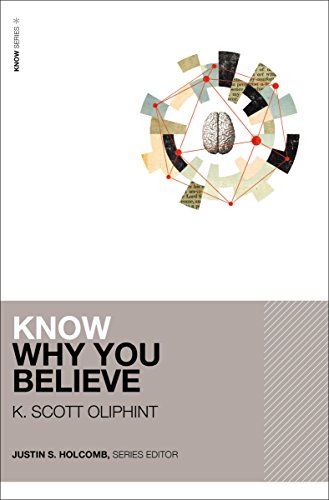A Brief Book Summary from Books At a Glance
By Steve West
About the Author
K. Scott Oliphint is professor of apologetics and systematic theology at Westminster Theological Seminary in Philadelphia and the author of numerous articles and books.
Introduction
Know Why You Believe is part of Zondervan’s “Know Series.” In this book, Oliphint provides an introductory look at reasons for believing in Christianity. He presents a biblically based rationale and apologetic, providing reasons for faith and responding to common objections.
Table of Contents
Introduction
Chapter 1 Why Believe in the Bible?
Chapter 2 Why Believe in God?
Chapter 3 Why Believe in Jesus?
Chapter 4 Why Believe in Miracles?
Chapter 5 Why Believe Jesus Rose from the Dead?
Chapter 6 Why Believe in Salvation?
Chapter 7 Why Believe in Life After Death?
Chapter 8 Why Believe in God in the Face of Modern Science?
Chapter 9 Why Believe in God Despite the Evil in the World?
Chapter 10 Why Believe in Christianity Alone?
Conclusion
Summary
Chapter 1: Why Believe in the Bible?
The Bible is the bestselling book of all-time, but many people believe that it is internally contradictory, outdated, and morally problematic. What accounts for the popularity of the Bible? There are both external and internal reasons for believing in the Bible. The Bible is a historical book that contains a message embedded in historical circumstances. Archaeology has verified many of the claims and details of Scripture. Jesus is referred to by several contemporaneous, non-Christian historians. Jesus confirmed the reliability of the Old Testament records. There are far, far more copies of the New Testament writings than any other ancient literature.
The writings that are included in the New Testament were recognized as divinely inspired—no Council was convened to determine the New Testament canon. Although the external evidence is strong, such evidence is not enough to persuade someone that the Bible is the Word of God. When we commit to Christ and read the Bible, we find that the Scriptures are intrinsically convincing. They are extremely diverse yet consistent in presenting a unified message. Their message lifts us to heavenly realities. It is by the work and attestation of the Holy Spirit that we can perceive these riches. To judge our senses we must rely on our senses; in an analogous way, to judge the Bible we must rely on the Bible. People assume that the Bible is full of contradictions, but if we approach it as a coherent whole, the alleged contradictions can be resolved. Accepting the truthfulness of the Bible is fundamental, since it is our guide and authority for everything else that we believe.
Chapter 2: Why Believe in God?
The new atheists have boldly proclaimed that belief in God is morally wrong, and that people ought not to believe in any deity. Christopher Hitchens argues at great length that religions are poisonous and evil, but he confuses what some people do in the name of religion with the religion itself. Genuine Christianity is absent from his tirades. Richard Dawkins argues passionately that people should reject theism and believe in evolution, even to the point of impugning the characters of those who disagree. All through history the vast majority of people have believed in a deity, and this is still the case today.
[To continue reading this summary, please see below....]The remainder of this article is premium content. Become a member to continue reading.
Already have an account? Sign In
